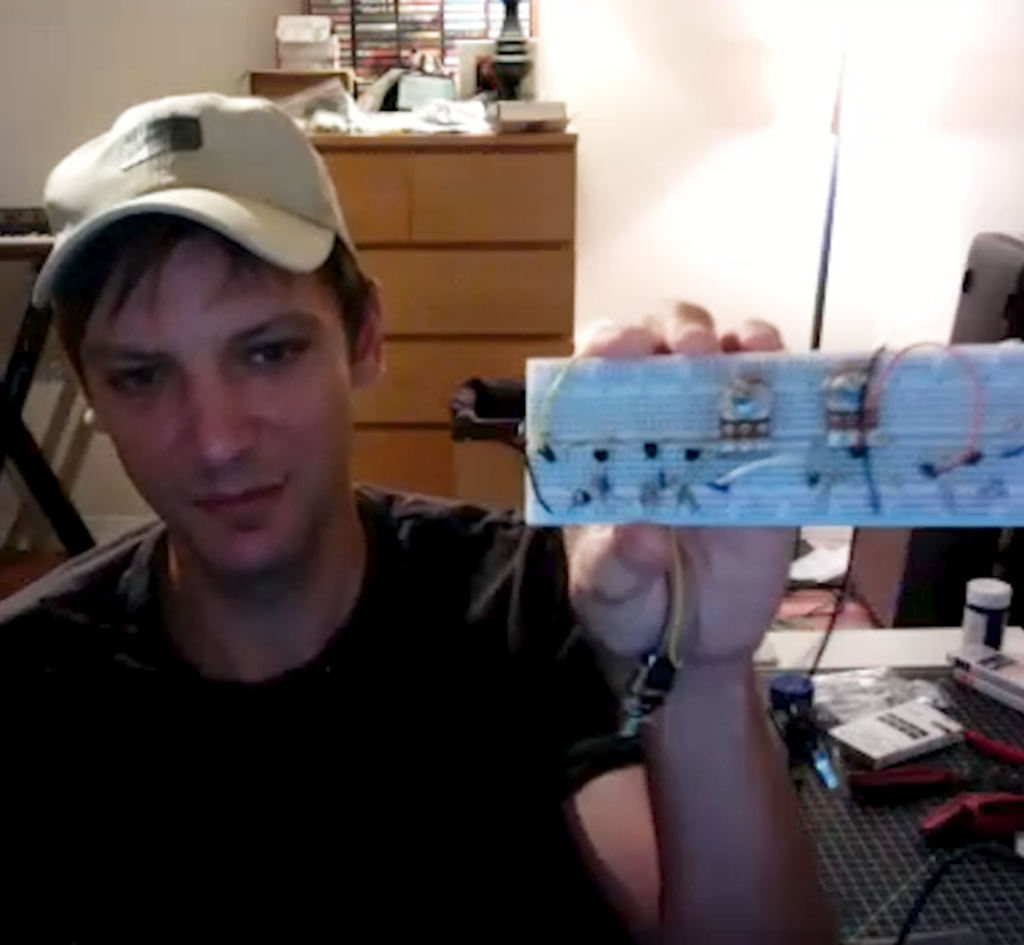Artist Interview + Video: Activity
Posted: by The Alt Editing Staff

Brooklyn experimental rock band Activity just put out their second album, Spirit In The Room, on August 4th. It’s an intense, layered, looping meditation on loss, with both organic instrumentation and electronic elements that combine to create fascinating textures — music you can almost touch, rather than hear. After 2020’s Unmask Whoever, Spirit in the Room confirms Activity as a band crafting their own lane from scratch.
I wanted to hear more about how the record was made, so I Zoomed with Travis Johnson, lead vocalist and multi-instrumentalist for the band (along with Jess Rees on guitar/vocals/keys, Bri DiGioia on bass/vocals, and Steven Levine on drums) and we talked about pulling songs out of jam sessions, having your label unexpectedly nail the theme of your album in the PR copy, why making guitar pedals is like making experimental music, and much more.
Check out the video of the chat below, and then read on for the full (lightly edited) Q&A.
How was release day for the album?
It was good. It feels a little more out there than last time. Last time was during the pandemic, the very beginning of it.
The first album was, like, two weeks into COVID or something, right? Was that just like, all right, let’s get it out there because the alternative is not knowing when we’re going to put this out?
I do remember writing to our label and publicist and saying, is there any way to delay it? And not even knowing if that was a good move or not. And I think the consensus was that it was too late. It had already been shipped to stores that would not be open.
Oh, god.
I remember our publicist saying people are going to need new music more than ever right now. Which was totally true. So yeah, this [release] was definitely better than that.
Right, and now you can play shows and do the full thing. So Spirit in the Room: I know with your first album, you weren’t a band for very long before you started recording. And this one, obviously, you had a bunch more lead time. What’s the average songwriting process for Activity?
There kind of isn’t one, but I guess it usually does take some version of me, but not always me, bringing in a little bit of an idea: maybe it’s a little bit of a guitar part, or sometimes a thing that I made on my sampler, and then sending that to people, and then gauging interest and seeing, is this something we want to work on? And then if it is, we actually have a dry erase board in the practice space with a list of all those ideas on it. A lot of it is dependent on the beat that Steve [Levine] comes up with.
So is there an improvisational element to it?
Yeah, big time. I would say half the songs are things that we would play for 20 or 30 minutes sometimes, just kind of feeling it out and recording it. And then we listen back to it and it’ll be like, “The thing you were doing there. Can you figure out how you were doing that, and do that again?”
I wanted to ask about the thematic element of the album, which I know has a lot to do with your mom passing, which, I’m very sorry about that. I was reading the copy surrounding your album and the word “haunted” was used, and I wanted to talk about that a little bit, both in the lyrical sense and in the way the music kind of evokes that feeling.
Yeah, it’s funny, with that word specifically…the album was called Spirit in the Room because I was listening to the album Dongs of Sevotion by Smog. It’s a very funnily titled album. My mom was a big Smog fan, and a Bill Callahan fan too. I was listening to that album and at some point he says “spirit in the room” on it and I was like, What about this for the title? But that was there before the ‘haunted’ thing — I hadn’t even thought of that word until I saw the press stuff that the label had written up. It’s kind of the perfect word. It really does get at the feeling of it, in hopefully not too emo of a way, just being kind of unable to think about anything else.
It’s funny that you said “emo” because I did also want to talk about the emotions of the songs, the feelings of the songs. We’re in, I would say, an emo-ish revival, where there’s not a lot of metaphor or a lot of abstraction with the way people are describing their feelings in music right now — to point out just one particular trend of one type of rock music. And I think Activity is doing something interesting, where at least to me, it seems like you are getting at a feeling by kind of going around it.
That’s definitely how I like to do it. For me, the things in other people’s music or art that usually make me feel the most affected, is just somebody kind of figuring out these weird ways to not hit you over the head with something, while very much presenting it to you. So that’s definitely the idea and I’m glad to hear it worked for you at least.
Yeah. Really leaving space for the other person to fill in what they feel.
It’s so much more powerful to me when somebody says something that’s evocative of a feeling, instead of describing the exact feeling. That’s what all my favorite writers do — and then very occasionally, they come in with a line that’s exactly clear-cut, like, there’s no ambiguity about it. And then that has more power, because you weren’t doing it the whole time.
That makes sense. I was thinking about the grieving of the album as something that’s personal. But also, what I feel like people keep forgetting is that everyone, everyone in the world, post-pandemic, is in a certain state of unrealized grief. There’s a lot of unprocessed stuff that people are working out in different ways.
Yeah, and certainly before the album was really taking any kind of definitive shape, for me — I don’t want to speak for anybody else in the band that was a huge thing, this awareness of not just the death from the pandemic, but also the alienation and the sense of, in a very unhealthy way, not having control over our agency. And I think some of the album is kind of getting at the pathologies that that might lead to — it sounds kind of pretentious, but modern things like that, that we didn’t have to deal with even five, ten years ago.
I don’t think that’s pretentious! It’s really relatable. Now, I want to ask you about guitar pedals, because I saw you made a special one that was on sale for regular people, that mimics a sound on the album. I’m a guitar pedal appreciator, but I have no idea how they work. Could you explain in layman’s terms what you’re doing with a guitar pedal like that?
That one specifically, I used to work at the pedal company Death By Audio, and that was a pedal that I had designed there. It was a limited edition. I saw that they were selling it for, I thought, too much. And I was like, oh, what if I come out with a new one that fixes some of the problems with it? That was the idea behind that. And then Jess, the other guitar player, and I had them on our pedal boards for the whole existence of the band. Here is what I was doing last night [he holds up a guitar pedal in progress…watch the video and you’ll see for yourself]. It’s this little thing that’s got components. You arrange them in certain orders, and there’s certain rules that you have to go by just to get things going, and then you can play around with it from there. You can kind of misuse and abuse parts to get weird sounds that, if you push it too far, won’t work at all.
It’s a little bit like writing experimental music, where you can do so much before it just turns into mush, or before it loses any effectiveness at all, and it’s just a schtick, or it’s unlistenable. There’s boxes like this lying around that are prototypes that might not ever come out, but have cool things on them. Like, I would feel bad selling them…I would maybe pay $10 to have one. But you never know what’s going to work until it does or doesn’t work.
See now, I’m just thinking of a The Music Man-style scam where you’re selling pedals that barely work, and you’re like, “This is the key to unlocking your music.”
When I first started playing music, there would be, and there probably still are, a lot of pedals that had a reputation like that — ones that got fetishized by a zillion people online. Or not even a zillion. Like, a hundred people. And so they became very valuable, but they’re in no way anything you need to make cool music.
You’re touring soon. I would love to hear what you would like a viewer of Activity in concert to take away from their experience. How do you want them to feel at the end of a show?
I hope it comes across as a unit that’s a gestalt kind of thing, where everything needs to be what it is in order for the whole thing to be better than the sum of its parts. I hope there is a feeling of us being all friends, and of there being a unique sense of, only these four people would have made this exact thing. We, probably to a fault, have an obsession with uniqueness. But that’s something I hope people get from it.
Hey, I think uniqueness is not the worst thing to aim for as your north star.
Yeah, I value it in us, because it means a lot to me in other bands, you know? It’s realizing, okay, well where were they good because they were unique, and where were they good because they were just good? And figuring that out for yourself.
Find Spirit in the Room on Bandcamp here, and Activity’s Linktree, which includes their fall tour dates, here.










